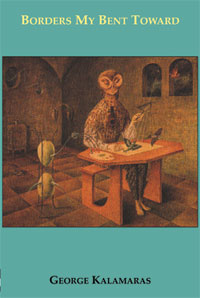

George Kalamaras
Borders My Bent Toward
Paperback Edition
ISBN 1-886350-62-0
116 pages
$12.00
Poetry, 2000
This authors second book includes poems which first appeared in American Letters & Commentary, American Writing, Asylum, The Bitter Oleander, Caliban, Contact II, First Intensity, Five Fingers Review, Hambone, High Plains Literary Review, Lingo, LIT, The Little Magazine, New American Writing, o.blek (Writing from the New Coast Anthology), Pavement Saw, Rhizome, Sulfur, Talisman, Untitled and Vert.
--------
The Sense of Lost
It was the sense of lost. An evening
of hurt hard enough to stop the begin.
He knew it, felt it in the human urge
to speak what sulfur might backlash
his bit. Right now, for a moment
though, he might hold it off. The way
the evening sun slants a shadowless.
But oh, for once maybe the past
might tense up again as if tensing
toughened a fist his throat might
swallow, no, gulp down knuckle brown
to rye. A gallop in his heart heard.
A lightning split across his eye.
Should he felt it? Bay at it? Blink
his massive eyelash as feathery salve? Feel
it urge again and find the missing
shape shaping there what was and might
still? For it could become. But
it was over, is over, he knew
it, hoped it might sure in his tongue
tonguing bits of spilled saliva, sun-dried
tomato pesto, flecks of pine nuts that might turn
to glass. How might the sound curve
back to vowel, shore up and blow apart
into a beautifully curved swan, prism-
formed and clear? An esophagus bent
of red acid eelgrass? Testicular folds?
Clitoral elongations into light? A hut
the shape of winged throats swallowing
reptiles whole yet human? One leg, two legs,
at a syntactic, at a full and gallop like missing
time? Limbs that might mete out a tail darting sunlit
brand across its back for wheat, right there
in public, in his most partial
poetic yet private? Hear me heard and heave.
Give me your lulling ectoplasmic. Give me your tongue
in sacred, dead twitching reptile
nerve. There was a sense of stop, even before
it a sound he heard the subtle stir begin, an evening
hurt in the backlash urge to make things
whole, more like emptiness, maybe, or a
yogic filling sat in vibrationless sound. Still
a black wall might darken
to white if that's all there was
on the saliva tongue. A healing mouth
might lost it in eat to clarify the butter
over ancient song, chlorinate, that is, the rippling cleanse
center clear through to crisp chameleon vowel,
to tender tiny eggs of vast young vaginal testicles,
all the way up without drop or become or horse
or creamy adult talk or first-throated swans
of something smothered but pure: knuckle brown, hot, deep.
-----------------
George Kalamaras first poetry collection, The Theory and Function of Mangoes, won the Four Way Books Intro Series Award. He is the recipient of Creative Writing Fellowships from the National Endowment for the Arts and the Indiana Arts Commission.
George Kalamaras's poems turn the poetic process upside down. The result is a poetry that hurtles the reader over the edges of perception and experience. His achievement becomes text as vision, and his visionary completion arrives through the surprise of a magical language.
--Ray Gonzalez
This new book by George Kalamaras is a fit successor to his prize-winning debut collection, The Theory and Function of Mangoes. Here, in the new book, the sheer abundance and quality of language, the inventiveness, are not usually encountered in today's occasions of poetry. Few collections send us on a journey of such magnitude both Earthy and as a testament to the enduring constellations of love.
--Gene Frumkin
The poetic world of George Kalamaras is the trickster world, in which identity is never fixed, and anything can become anything else at the drop of an image. It is also the world of the metaphysical visionary and pilgrim. In these brilliant and endlessly resourceful poems, the materiality of language at every moment plays both with and against the spirit's drive towards transcendence. "Is there a way out of one's soul?" the poet asks. "I might one day arrive on your stoop, clasping a box of my own thinking dust," he warns us. And, of course, he does arrive on our stoops, bringing with him not only his own thinking, playing, dreaming, and endlessly seeking dust, but also the gift of a visionary and electrically-charged language. Sometimes unsettling, sometimes profoundly erotic, sometimes dense with broken parts of speech, with syntax wrenched from its predictable order, these poems never do the expected. Their power springs equally from yogic meditation with its search for a dissolution of the self's boundaries, surrealism with its privileging of irrational and playful juxtaposition as a mode both of discovery and of revolt, and the ancient traditions of riddle and wordplay. This is a global poetry for the 21st century, at home equally with the great meditative traditions of Asia, Europe, and the Americas.
--Judith Johnson

